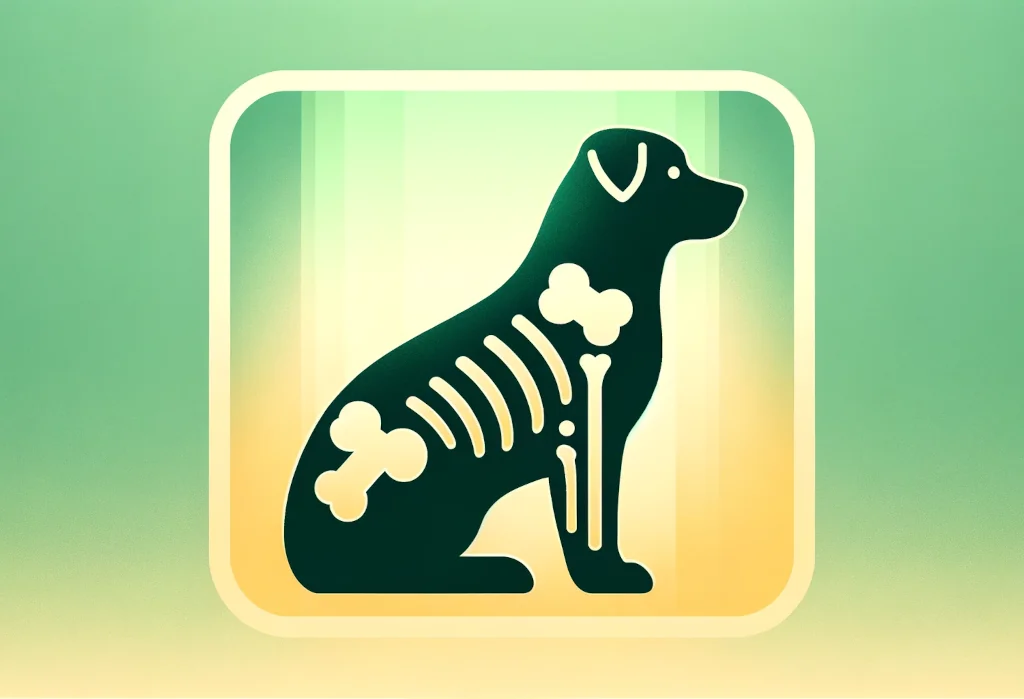Watching your dog leap and bound with joy is one of the simple, yet profound pleasures of pet ownership. But with every joyful jump and frenzied frolic comes the slight, nagging worry: What if they hurt themselves? It’s a thought we shove to the back of our minds, hoping we’ll never have to deal with it.
In this blog post, you’re going to find out how to minimize that worry by learning the best ways to prevent bone fractures in your dog, keeping them as happy and healthy as possible.

Quick Takeaways:
- Balance your dog’s diet with calcium, Vitamin D, and phosphorus to strengthen bones, but avoid excesses.
- Tailor exercise to your dog’s age, breed, and size, prioritizing moderation to prevent injury.
- Consult your vet before adding supplements to ensure they complement your dog’s specific health needs.
What Can You Do to Strengthen Your Dog’s Bones?
When it comes to bolstering your canine companion’s bone health, nutrition sits right at the heart of the matter. Just like in humans, a dog’s diet is pivotal in ensuring their bones are strong and resilient.
Aim for foods rich in calcium, Vitamin D, and phosphorus – these are the all-stars for bone health. But remember, balance is key. An excess of these can be just as harmful as a deficiency. Premium dog foods usually hit the mark, but it’s always good to check the label. For a home-cooked diet, consider adding dog-safe fish (like salmon, which is a great source of vitamin D) and green leafy vegetables for calcium. However, consult with your vet first because each pup’s needs can vary wildly.
Feeding schedules and portion control play an unsung role here too. Avoid “free-feeding” to help maintain a healthy weight; excess pounds put unnecessary strain on your dog’s skeleton. And about those regular vet check-ups, they’re not just a formality. They allow for early detection of bone health issues, ensuring your dog gets the right nutrients in the correct amounts.
How Important Is Exercise for Bone Health?
Exercise is not just about keeping Fido fit; it’s a cornerstone of good bone health. Think of it as a balancing act – too little exercise and your dog’s bones may weaken; too much, and you risk injuries and fractures. The magic word? Moderation. Here’s how you can ace it:
- Start slow, especially if your dog isn’t used to regular exercise.
- Mix up activities: walking, swimming, and gentle fetch. Variety is not just the spice of life; it helps work different muscle groups and bones.
- Pay attention to age, breed, and size. A Chihuahua will have different exercise needs compared to a Labrador Retriever. Senior dogs might benefit from gentle walks and low-impact activities to keep them moving without overtaxing their joints.
Are There Breed-Specific Concerns You Should Know About?
Absolutely. When it comes to bone health, not all breeds are built the same. Some, like Dachshunds or Greyhounds, have a predisposition to certain bone and joint issues. For the long-bodied and short-legged crew (think Dachshunds, Basset Hounds), it’s crucial to keep them at a healthy weight to avoid unnecessary stress on their spines. Greyhounds, on the other hand, are sprinters with a high risk of leg fractures.
Knowledge is power. Understanding the genetic predispositions of your dog’s breed can guide you in providing the best care. Consider breed-specific exercises that strengthen the right muscles and bones without overstraining them. For instance, swimming is fantastic for almost all dogs but is particularly beneficial for larger breeds prone to hip dysplasia, like Golden Retrievers, since it’s a low-impact activity that doesn’t stress the joints.
Incorporating these tailored approaches into your dog’s routine can make a world of difference in keeping their bones strong and healthy. Remember, though, every dog is an individual. Even within breeds, needs can vary, so keep an eye on how your dog responds to different activities and adjust as necessary. Partnering with your vet can help you fine-tune your approach to best support your furry friend’s bone health.
When Should You Be Extra Cautious?
Navigating the life stages of your furry friend with an eye on bone health means understanding when they’re most at risk for fractures. Let’s dive into the puppyhood and senior years, the two critical periods that require your extra attention and care.
Puppyhood – The Foundation Phase
Puppies are just like toddlers, brimming with curiosity but lacking in caution. This stage is all about rapid growth and development, making it prime time for nutritional support and safe play.
- Nutrition: Ensure your puppy’s diet supports bone growth. Look for foods rich in calcium and phosphorus, key building blocks for strong bones.
- Exercise: Too much of a good thing can be harmful. Overly vigorous activities could potentially damage developing bones. Stick to gentle exercises like short walks and controlled play.
Senior Years – The Careful Watch
As dogs age, their bones lose density and become more brittle, akin to the aging process in humans. This fragility ups the ante for fractures, even from minor mishaps.
- Joint supplements: Ingredients like glucosamine and chondroitin support joint health, potentially easing the strain on bones.
- Regular vet check-ups: Keeping an eye on bone density and joint health can help catch signs of weakening early, allowing for preemptive action.
A unique tip? For breeds known to have bone and joint issues, consider incorporating gentle swimming sessions into their routine. It’s a fantastic way to maintain muscle strength without putting undue stress on the bones.
Can Supplements Help Prevent Bone Fractures?
When it comes to safeguarding your dog’s bones, supplements can be a game-changer, but it’s not a one-size-fits-all solution. Here’s the scoop on navigating the world of supplements for bone health.
Do the Homework
Not all supplements are created equal. Key ingredients known for supporting bone health include:
- Calcium: The cornerstone of bone health but can be harmful in excess.
- Vitamin D: Helps in calcium absorption, critical for strong bones.
- Omega-3 fatty acids: Support bone density and can reduce inflammation, benefiting overall joint health.
Quality and Safety First
Look for supplements that have been independently tested for quality and efficacy. Trustworthy brands will often have a seal of approval from organizations like the National Animal Supplement Council (NASC).
Consultation is Key
Always consult with your vet before adding supplements to your dog’s diet. They can provide tailored advice based on your dog’s health status, dietary needs, and existing medications.
A little-known but highly beneficial advice? Consider incorporating natural sources of bone-supporting nutrients into your dog’s diet. For example, sardines are a great source of calcium and omega-3 fatty acids. Just be sure to confirm with your vet that these additions are suitable for your pet.
While supplements can certainly play a role in maintaining your dog’s bone health, they’re part of a bigger picture that includes proper nutrition, the right amount of exercise, and regular veterinary care. Remember, there’s no magic pill for health – it’s about creating a balanced, thoughtful approach to your dog’s wellbeing.
Alex, a passionate animal lover, has experience in training and understanding animal behavior. As a proud pet parent to two dogs and three cats, he founded AnimalReport.net to share insights from animal experts and expand his knowledge of the animal kingdom.



